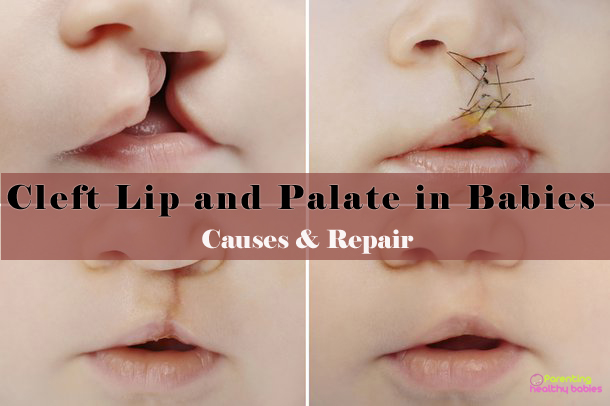Cleft lip and palate is a condition in which there is a tear of the lips or roof of the mouth, at birth. It is a common birth anomaly and may present a frightening picture to parents. Both cleft lip or cleft palate may affect either one or both sides of the face.
Cleft lip and Palate
Why does cleft lip and palate occur?
Cleft lip and palate is a developmental defect that develops in the womb itself. This occurs because normal fusion of tissues does not occur, leaving a gap or space in between the unfused tissues.
Causes of cleft lip and palate
There are a number of factors that can increase the chances of a mother having a baby with cleft lip and palate. Read on for more information-
Genetics
Many genes have been found to be associated with the development of cleft lip and palate. Family history of cleft lip and palate also results in greater chances of having a baby with the same problem.
Smoking
Mothers who smoke during pregnancy have greater risk of producing cleft lip and palate in their babies
Alcohol
Alcohol consumption during pregnancy may result in fetal alcohol syndrome. This syndrome includes cleft lip and palate in the baby.
Medications
Certain medications such as anticonvulsant drugs such as phenytoin and valproate, thalidomide, dioxin and retinoids, if taken during pregnancy, are associated with the development of cleft lip and palate in a baby.
Nutritional deficiency
A deficiency of folic acid and zinc during pregnancy predisposes to development of cleft lip and palate.
Obesity
High fat diets during pregnancy may increase chances of cleft lip and palate.
Diabetes
Diabetic mothers may be at greater risk of having babies with cleft lip and palate.
Infections
Infections such as rubella or German measles during pregnancy may increase the risk of a baby developing cleft lip and palate.
Problems associated with cleft lip and palate
Cleft lip and palate results in a few problems for both baby as well as mother and requires ongoing support. The following problems may occur due to a cleft in the lip or palate-
Feeding problems
Babies with a cleft lip or palate have difficulty feeding since the tear in the lip or palate makes it difficult to suck and latch effectively. Further, milk may leak into the nose since the barrier between mouth and nose is improper, creating feeding difficulties.
Ear infections
Babies with cleft lip and palate are more prone to ear infections and hearing problems.
Speech problems
Pronunciation of words that require contact with the palate is affected in cleft palate affected children. There may also be nasal sounding speech.
Dental problems
A baby with cleft lip and palate may develop dental problems as the teeth erupt, if the cleft or tear runs through the area of tooth eruption. A baby with cleft palate generally has a small sized upper jaw and this results in improper tooth contact (malocclusion) and improper jaw growth.
Psychologic problems
Children with cleft lip and palate may develop low self esteem and depression because of the disfiguring appearance of this problem, if timely correction is not undertaken.
Treatment
Cleft lip and palate is a treatable condition and appropriate care must be sought at the earliest. Cleft lip and palate requires teamwork, based on care from multiple different specialists. A few management strategies are outlined below-
Surgical cleft repair
A plastic surgeon will undertake repair of a cleft lip and/or palate at the right time. This may involve a single or sequence of surgeries, depending on the size of the defect.
Pediatric care
Baby problems regarding feeding, use of special baby bottles and modified nipples and overall nutrition problems are addressed by the pediatrician.
Speech therapy
Speech therapy helps in correct pronunciation of words and is usually an ongoing process as the child grows.
Dental correction
A pediatric (children’s) dentist and orthodontist will correct dental problems gradually as they appear through dental appliances, extractions and bone grafting. This is again an ongoing process and will continue as the child grows.
Management of hearing and ear infections
An ear-nose-throat specialist is usually required to look into persistent ear and hearing problems.
Counseling
A counselor can help the parents of a child with cleft lip and palate to understand and cope with the problems they might be facing. As a child grows, a child counselor can help a child too, if he/she feels a lack of confidence about his/her appearance.
A lot of stigma surrounds cleft lip and palate and many unfounded myths add to the stress of parents who have a baby with this condition. In the absence of risk factors in the mother, cleft lip or palate may arise due to no apparent reason, because of its genetic causes. Nobody must be blamed for this and a mother must be supported emotionally in this difficult time. It is a manageable problem and as a parent, seek a doctor’s advice at the earliest to deal with the problems you might face as a result of this. Counseling and medical care will greatly help you as a parent gain correct information and treatment for your child.
Stay aware, stay safe.
References
https://www.ncbi.nlm.nih.gov/pmc/articles/PMC4771933/
https://www.cdc.gov/ncbddd/birthdefects/cleftlip.html
